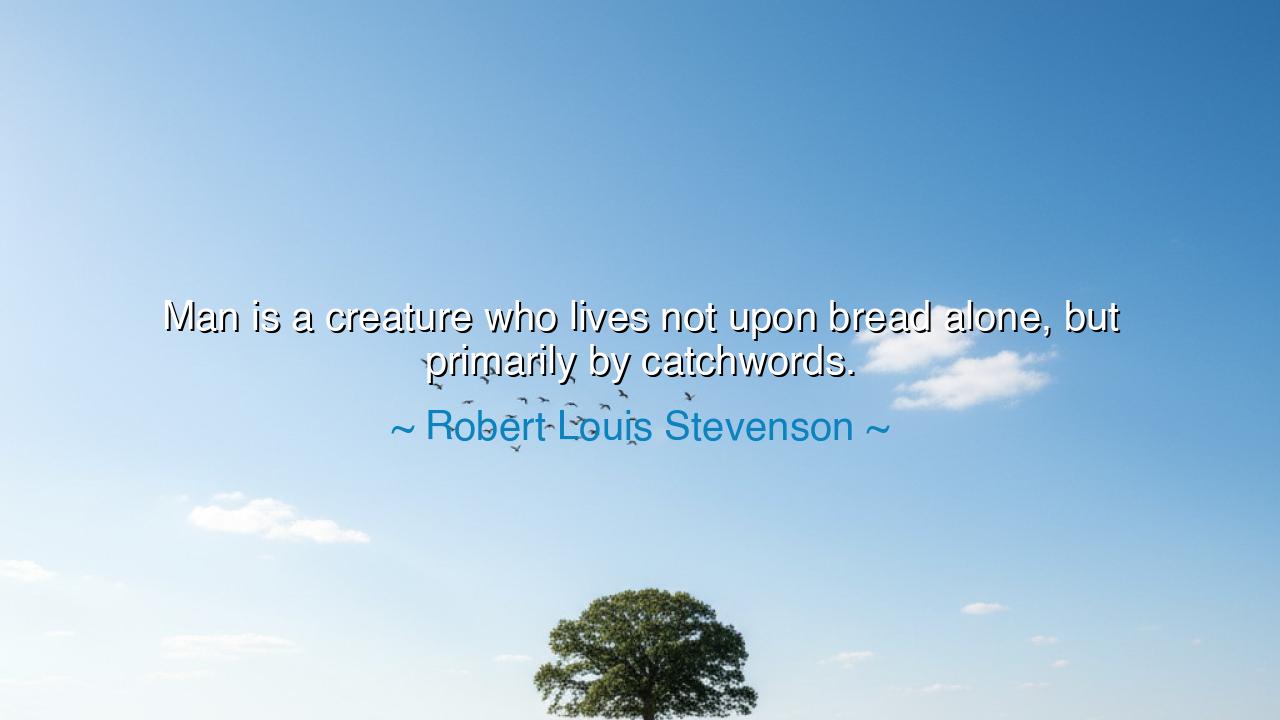
Man is a creature who lives not upon bread alone, but primarily






In the sharp and prophetic words of Robert Louis Stevenson, the Scottish author and moral philosopher, he wrote: “Man is a creature who lives not upon bread alone, but primarily by catchwords.” These words, rich in irony and truth, pierce through the veil of human vanity to reveal a subtle, uncomfortable reality: that while the body hungers for food, the soul often hungers for belief — and too often, that belief is fed not by wisdom, but by words. Stevenson, who observed the follies and ideals of men with both compassion and clarity, saw how easily the human heart is stirred not by reason, but by slogans, phrases, and symbols. We call them catchwords, and though they are mere sounds, they wield the power to shape nations and destroy them.
When Stevenson declares that man “lives not upon bread alone,” he borrows the ancient echo of Scripture — the words of Christ in the desert: “Man shall not live by bread alone, but by every word that proceeds from the mouth of God.” Yet Stevenson, with a modern and ironic twist, shows that man has replaced the Word of God with the words of men — hollow catchphrases that promise salvation but deliver confusion. The catchword becomes a counterfeit gospel, a rallying cry that feeds the ego while starving the spirit. Whether political, religious, or cultural, these phrases — “freedom,” “progress,” “justice,” “honor,” “nation” — are invoked as sacred, yet few pause to question what they truly mean.
The origin of this quote comes from Stevenson’s reflections on the moral life of modern society. Living in the late nineteenth century — an age of industrial growth, political upheaval, and intellectual pride — he saw how humanity, freed from the old certainties of faith, sought new idols in ideology and noise. Men no longer worshipped in temples but in movements, no longer followed prophets but orators. He observed that man’s deepest hunger is for meaning, and that meaning, when not grounded in truth, becomes vulnerable to the seduction of words — words that flatter, words that divide, words that promise glory. Thus, man became not a seeker of wisdom, but a consumer of slogans.
History bears witness to Stevenson’s warning. Consider the age of revolution and war: how often have people been moved not by truth, but by catchwords shouted from podiums? “Liberty,” “Purity,” “Empire,” “Race” — such words have stirred millions to both noble action and unspeakable cruelty. In France, the cry of “Liberté!” inspired courage, but it also fueled the guillotine. In Germany, a generation later, false catchwords cloaked madness in patriotism. And even in our time, societies rise and fall to the rhythm of the words they worship. The true danger is not in the words themselves, but in the unthinking faith with which they are received.
Yet Stevenson’s insight is not wholly cynical. Beneath his irony lies a deeper understanding of what words can be when properly honored. If man is nourished by catchwords, then he must learn to choose his nourishment wisely. Words are not evil; they are vessels. A noble phrase, rooted in truth and lived in action, can inspire generations. “Freedom,” when spoken with understanding, has moved slaves to rise and tyrants to fall. “Love,” when lived as more than sentiment, has rebuilt broken worlds. The catchword becomes holy when it calls the soul upward — when it awakens, not blinds.
The lesson, then, is this: guard the words that guide you. Do not feed your soul with slogans that soothe but do not enlighten. Ask always what lies beneath the phrases that stir your heart. Does this word lead me to truth, or merely to belonging? Does it challenge me to think, or lull me into comfort? For every age is ruled by its catchwords, and every wise man must rise above them — not to despise them, but to redeem them.
So, dear listener, remember the wisdom of Robert Louis Stevenson: man lives not by bread alone, but by the meaning he draws from words. Choose, then, your words as you would your food — with discernment, reverence, and gratitude. Let your heart be nourished not by noise, but by truth; not by catchwords that echo, but by ideals that endure. For in an age where many live by empty words, the one who lives by true ones walks in freedom.






AAdministratorAdministrator
Welcome, honored guests. Please leave a comment, we will respond soon